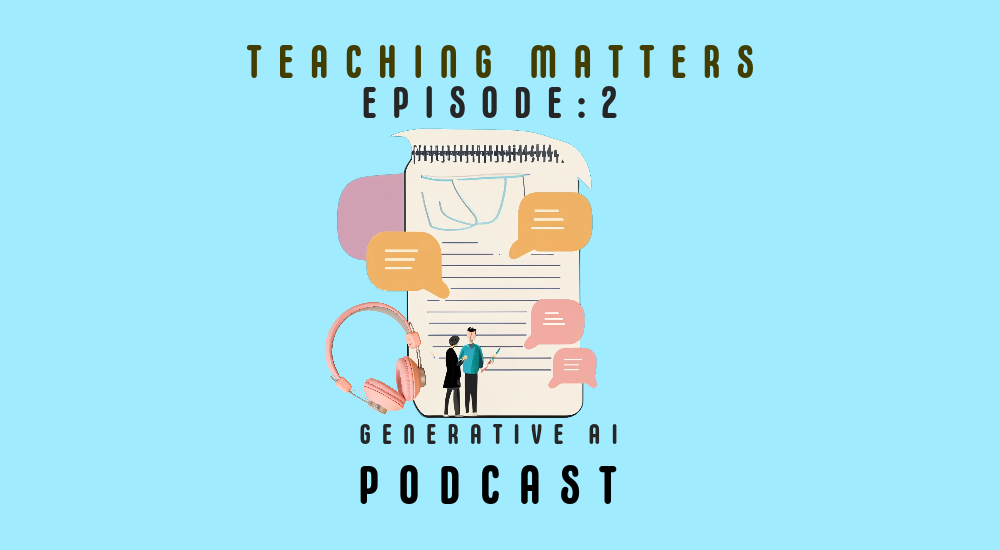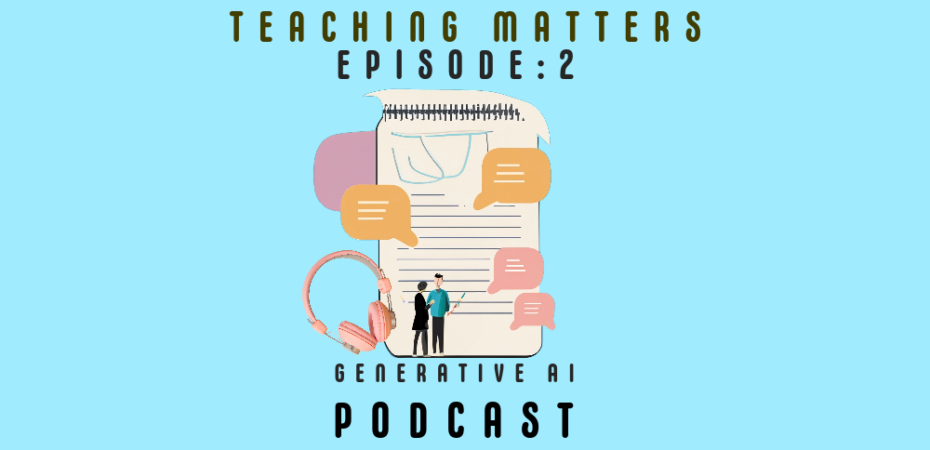
The second episode of Generative AI podcast series↗️ features a conversation between Irene Xi, an MSc student (Sociology and Global change) and Dr Vasileios Galanos, Teaching fellow at the Science, Technology and Innovations department↗️, The University of Edinburgh. Irene brings in a unique student perspective to the current conversations surrounding AI Technology usage. The first episode of this podcast series featured a conversations on Generative AI: Past, present and future↗️.
In this episode, Vasileios asks the following questions to Irene:
1. How does it feel to be an MSc student at The University of Edinburgh in terms of coursework?
While Irene finds the academic atmosphere at the University intellectually rewarding, she highlights some of the unique challenges faced by international students, for instance the hurdles in transitioning to the university culture. She discusses student experience surrounding intense coursework, assignments, and impending deadlines.
The University of Edinburgh, like many other British institutions, is known for its high standards and a rigorous education approach. So I think for local students and those already familiar with the system, this will not be a big deal …. But for international students, it can be challenging because they are entering a completely new world, a new culture, a new classroom, a new environment, new people and a new language… …. international students only have a short time period to transition and fit in to this environment. And I think it can affect their confidence in expressing their ideas effectively, including writing essays and participating in class discussions.
2. Why would students be tempted to use AI software to help with their essays?
Irene discusses several reasons why a student might choose to use AI tools to write their essays.
Firstly, she talks about the assessment pressure:
..multiple assessments, tight deadlines and heavy weekly workload… When people are placed under that situation, they may feel overwhelmed and panic. So as a result, they may turn to these AI tools… There’s an old Chinese saying that ‘a drowning man will grasp a straw’, like when people are in a desperate situations, they will turn for whatever that is possible to save them. So when students are in a time crunch, they attempt using AI tools… just see them as life saving boats..
Secondly, Irene talks about the nature of written essays; that the process of writing is vastly hidden and individualised, and the markers see mostly the final, finished product. Such an invisibility factor might tempt a student to use AI tools as a shortcut.
Lastly, Irene points to the several advantages AI tools offers to students who don’t speak English as their first language:
International students use this tools to translate their original language essays into English version, because this is faster than writing the English version by themselves.
3. Have you tried these software at all, what did you see? Are they good, have they got any limitations?
Irene talks about use cases of AI tools such as paraphrasing, proofreading and translation. While she finds Generative A effective in completing some of the tasks, she says she holds a cautious approach, as there might be some limitations to AI usage.
Irene adds:
I found that the answers generated by [ChatGPT] tend to remain on the surface level. I did actually ask this question to ChatGPT – why do people protect the environment? It gave me a few bullet points like, ‘it is good for economic growth, it is good for human health’, but it did not provide me in-depth data or counter-arguments to explain these things. So, I think I cannot rely solely on this in order to get a high mark because, like in that case, I cannot show critical thinking…
4. How do you think MSc students would use these AI technologies in five years from now?
In future, Irene says AI technologies will continue to become more prevalent in academia. She foresees academia embracing AI more in the future, while emphasising the need for cautious attention to its limitations.
I do actually think they are valuable ally for students. So I think even future students may continue to use this tools…it’s just kind of like a double-edged sword.
I think the future trend might be selective use of AI tools.
In this conversation, Irene talks about the nuances of AI usage in academia through a student lens. AI seems to not only enhance learning but also levels the playing field for students from diverse backgrounds. However, we must remain vigilant, as the same connections that can open doors may sometimes exaggerate biases.
The next episode of this series will focus on the unspoken, hidden issues of Generative AI – especially the digital divide, the hidden labour and the biases.
Stay tuned!
Timestamps:
2:00 – How does it feel to be an MSc student at The University of Edinburgh in terms of coursework?
5:00 – In terms of marking scale, could you tell us what does a 55%, a 65% 75% mean to you? How does these numbers resonate with you?
7:20 – Why would students be tempted to use AI software to help with their essays?
10:55 – Have you tried these software at all, what did you see? Are they good, have they got any limitations?
13:45 – How do you think MSc students would use these AI technologies in five years from now?
 Irene Xi
Irene Xi
Irene Xi is a postgraduate student, currently undertaking Sociology and Global Change course at The University of Edinburgh. She earned a Communication Bachelor’s degree from Monash University. Also, she is a Chinese girl who is enthusiastic and interested in AI and online technologies.
 Vasileios Galanos
Vasileios Galanos
Vasileios Galanos (it/ve/vem) is a Teaching Fellow in Science, Technology and Innovation Studies at the School of Social and Political Science, University of Edinburgh and Associate Editor of the journal, Technology Analysis and Strategic Management. Vasileios researches and publishes on the interplay of expectations and expertise in the development of AI, robotics, and internet technologies, with further interests in cybernetics, media theory, invented religions, oriental and continental philosophy, community-led initiatives, and art. Vasileios is also a book, vinyl, beer cap, and mouth harp collector – using the latter instrument to invite students back from class break.
Twitter handle: @fractaloidconvo
Episode produced and edited by:
 Sylvia Joshua Western
Sylvia Joshua Western
Sylvia is currently doing her PhD in Clinical Education at The University of Edinburgh and has a Master’s degree in Clinical Education. Her PhD research explores test-wise behaviours in Objective Structured Clinical Examination (OSCE) context. Coming from a dental background, she enjoys learning about and researching clinical assessments. She works part-time as a PhD intern at Teaching Matters, the University’s largest blog and podcast platform through Employ.ed scheme at the Institute of Academic Development.
 Joséphine Foucher
Joséphine Foucher
Joséphine is doing a PhD in Sociology at The University of Edinburgh. Her research looks at the intersection between art and politics in contemporary Cuba. She supports Jenny Scoles as the Teaching Matters Co-Editor and Student Engagement Officer through the PhD Intern scheme at the Institute for Academic Development.


